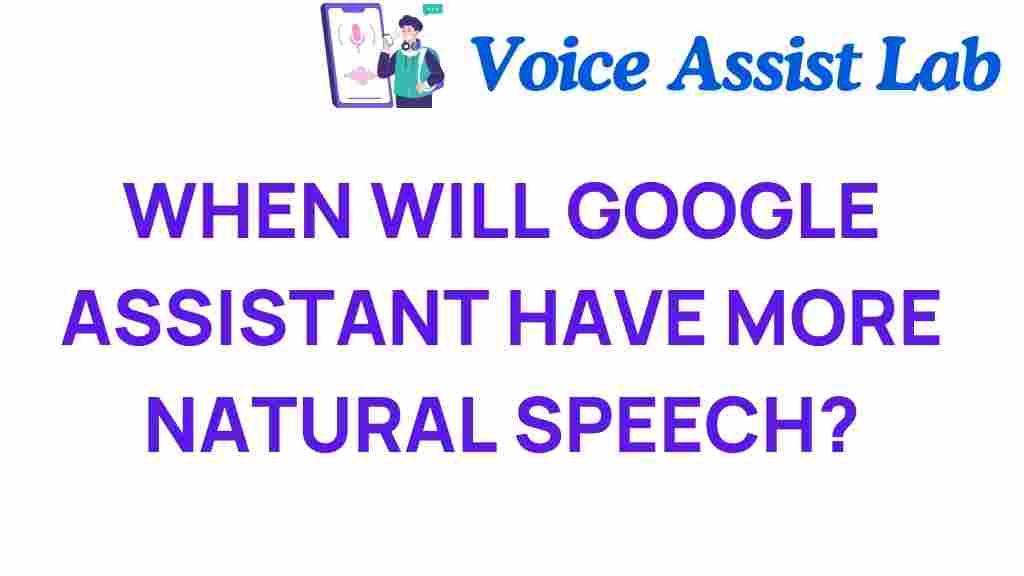The Future of Voice: When Will Google Assistant Speak Naturally?
As technology continues to evolve rapidly, one of the most fascinating advancements is in the realm of voice technology. Among the leaders in this field is Google Assistant, a digital assistant that leverages the power of artificial intelligence (AI) to communicate and interact with users. But as innovative as Google Assistant is, the question remains: when will it truly speak naturally? In this article, we will delve into the advancements in AI communication, the current state of speech synthesis, and what the future holds for conversational AI and user experience.
Understanding Natural Speech in Voice Technology
Natural speech refers to the way humans naturally communicate, using nuances, intonations, and a variety of expressions that convey meaning and emotion. For Google Assistant and other digital assistants, achieving natural speech is a significant challenge, as it requires a deep understanding of human language and context.
Here are a few key components that contribute to natural speech:
- Context Awareness: The ability to understand the context of a conversation and respond accordingly.
- Emotion Recognition: The ability to detect emotional cues in the user’s voice and respond empathetically.
- Intonation and Prosody: The modulation of voice that conveys meaning beyond words, such as sarcasm or excitement.
The Role of Speech Synthesis in Google Assistant
Speech synthesis technology is crucial for creating a voice that sounds natural and engaging. This technology converts text into spoken words, and its advancements have made significant strides in recent years. Google Assistant uses advanced speech synthesis techniques to produce a voice that mimics human speech patterns.
Key advancements in speech synthesis include:
- WaveNet Technology: Developed by DeepMind, WaveNet generates more realistic human-like speech compared to traditional methods.
- Voice Cloning: This technology allows for the creation of custom voices that can sound like specific individuals.
- Multi-Speaker Systems: These systems enable Google Assistant to switch between different voices and personalities.
Technology Advancements in AI Communication
As machine learning and AI continue to evolve, so does the ability of digital assistants like Google Assistant to engage in more natural conversations. Here are some notable advancements:
- Deep Learning Models: These models help in understanding and predicting user queries more accurately.
- Natural Language Processing (NLP): NLP enables Google Assistant to comprehend and process human language, making it easier to generate responses that feel human-like.
- Conversational Context: Google Assistant can now retain context over multiple exchanges, allowing for more fluid conversations.
Enhancing User Experience with Google Assistant
The ultimate goal of Google Assistant is to improve user experience. Here are several ways in which natural speech enhances user interaction:
- Improved Engagement: Users are more likely to engage with a digital assistant that sounds conversational and relatable.
- Increased Efficiency: Natural speech can lead to quicker resolutions and smoother interactions.
- Personalization: Users appreciate responses that feel tailored to them, which is easier to achieve with natural speech.
Challenges in Achieving Natural Speech
Despite significant progress, there are still challenges to overcome when it comes to making Google Assistant speak naturally:
- Understanding Nuance: Capturing the subtlety of human conversation remains a complex task.
- Handling Ambiguity: Human language is often ambiguous, and teaching AI to navigate this complexity is ongoing work.
- Scaling Voice Options: While voice variety is increasing, ensuring that all voices sound natural and are contextually appropriate is challenging.
Future Prospects for Conversational AI
As we look ahead, several trends indicate that Google Assistant will continue to evolve towards more natural speech:
- Increased Personalization: Future iterations of Google Assistant may allow users to customize their experience even further.
- Integration of Emotion AI: The incorporation of emotion recognition technologies could enhance the ability to respond appropriately to user emotions.
- Continued Learning: Ongoing improvements in AI learning algorithms will enable Google Assistant to adapt and improve over time.
Step-by-Step Process to Enhance Your Google Assistant Experience
If you want to optimize your use of Google Assistant and enjoy a more natural interaction, follow these steps:
- Update Your Device: Ensure that your device is running the latest version of Google Assistant to benefit from the latest features.
- Personalize Settings: Customize preferences and settings to help Google Assistant understand your voice and preferences better.
- Practice Commands: Use clear and concise commands to enhance the accuracy of responses.
- Give Feedback: Provide feedback on responses to help improve future interactions.
Troubleshooting Tips for Google Assistant
While using Google Assistant, you may encounter issues that affect your experience. Here are some common troubleshooting tips:
- Voice Recognition Issues: If Google Assistant struggles to understand you, try speaking more slowly or adjusting the microphone settings on your device.
- Response Delays: If responses are delayed, check your internet connection, as a weak connection can hinder performance.
- Inaccurate Responses: If the responses seem off, try rephrasing your question or command for clarity.
Conclusion
The future of voice technology, particularly with Google Assistant, is poised for exciting developments. As advancements in AI communication, speech synthesis, and conversational AI continue to unfold, we can anticipate a time when Google Assistant speaks more naturally than ever before. This evolution will not only enhance user experience but also revolutionize the way we interact with digital assistants.
For more insights into technology advancements in voice technology, check out this resource.
As we continue to embrace these innovations, one thing is clear: the future of voice technology holds great promise, and Google Assistant is at the forefront of this transformation.
This article is in the category Voice and created by VoiceAssistLab Team
